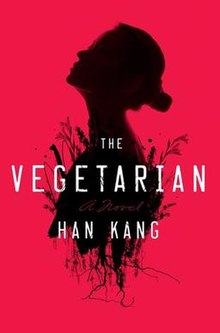
I had earmarked Han Kang’s The Vegetarian as to-read on Goodreads way back in 2016. I think it was possibly because it won the Man Booker Prize that year. Or maybe I wanted to look cool in front of my Goodreads followers. Who knows, really? Irony probably died a million deaths as I swiped across my Kindle while laying into the brilliant homestyle chicken curry my mother had made for lunch. For those aghast at the horrific crimes I’ve committed, let me assure you the book is anything but about vegetarianism. It is overtly graphic, gruesome at times, and a voyeuristic descent into nothingness. Also, this could really do with a bunch of trigger warnings!

The book is a triad of novellas, each from a singular POV with Yeong-Hye, a South Korean homemaker at the centre of it all, her husband, her brother-in-law and her sister being the respective narrators. The first portion, The Vegetarian revolves around Yeong-Hye’s switch to vegetarianism acting as a behavioural trigger for all around her and we’re forced to watch as she’s subjected to social derision, physical and verbal violence by her own family and ostracized by her husband who’s giving up on her. It’s a tough take but you have to give it to her for holding her ground among this tough crowd. It’s particularly hard to see her give up on herself, you’ll know what I’m talking about. The second bit, Mongolian Mark, revolves around her brother-in-law’s sexual fascination with her and how a particular form of visualization (a specific birthmark on her buttock ) leads to several boundaries being crossed. Art is a dominating factor in this bit with a lot of visual titillation, meant to impact the reader forcefully. Shit really goes down here. The final portion, Flaming Trees, becomes an extended dialogue about identity and one’s mortal existence. Yeong-hye’s sister In-hye is the only support she has, as the former is admitted to a hospital for recuperating her mental health. Yeong seems to have given up on life as we know it and In-hye struggles to cope with it while dealing with her own instability and depression, the text being abjectly grim and grey throughout.
The Read: Do not be fooled by its pocket-sized look, The Vegetarian is a deep, gritty read. It desires your constant attention, it demands it quite frankly. The common theme across the three bits are the powerful graphic scenes Kang manages to conjure – erotica, mania, pain, depression, instability, and nihilism with equal precision and grace. The trauma feels absolutely real with sexual and physical violence against women everpresent throughout the book. It leaves you pondering about a lot of stuff but as the author herself puts it: “why pain, why death?”
Trivia: The second portion, titled Mongolian Mark, refers to the Mongolian spot, a bluish birthmark on the buttock. It was described and named after Mongolians by Erwin Bälz, a German anthropologist based in Japan, who erroneously believed it to be most prevalent among his Mongolian patients. Korean mythology explains the nevus as a bruise formed when Samshin halmi or Samsin Halmoni , a shaman spirit to whom people pray around childbirth, slapped the baby’s behind to hasten the baby to quickly get out from his or her mother’s womb. (Reference)
Documentation
Book: The Vegetarian
Author: Han Kang (translated to English by Deborah Smith, who shared the Man Booker with her)
Year of Release: 2007, Translated in 2015
Publisher: Changbi and Portobello